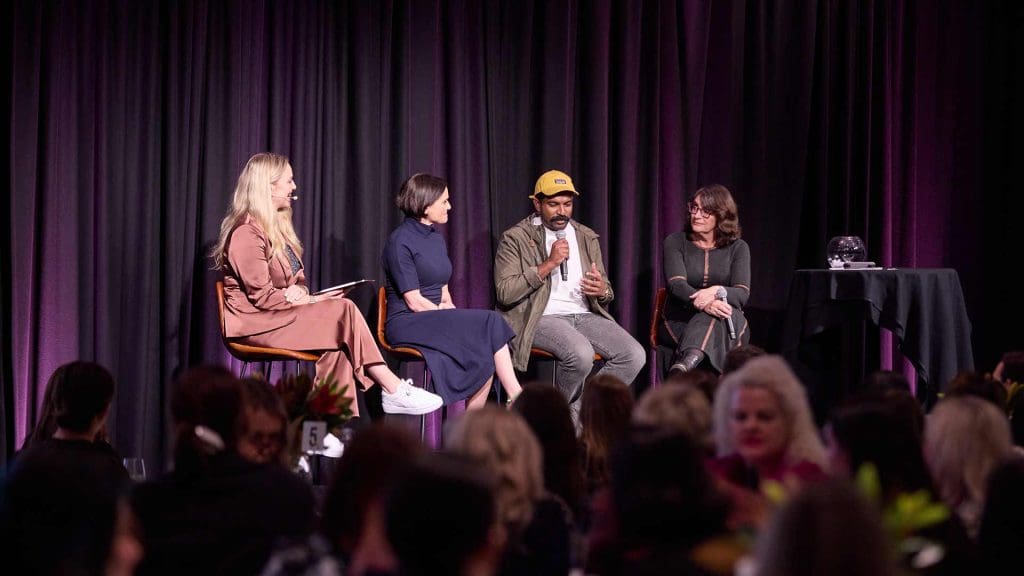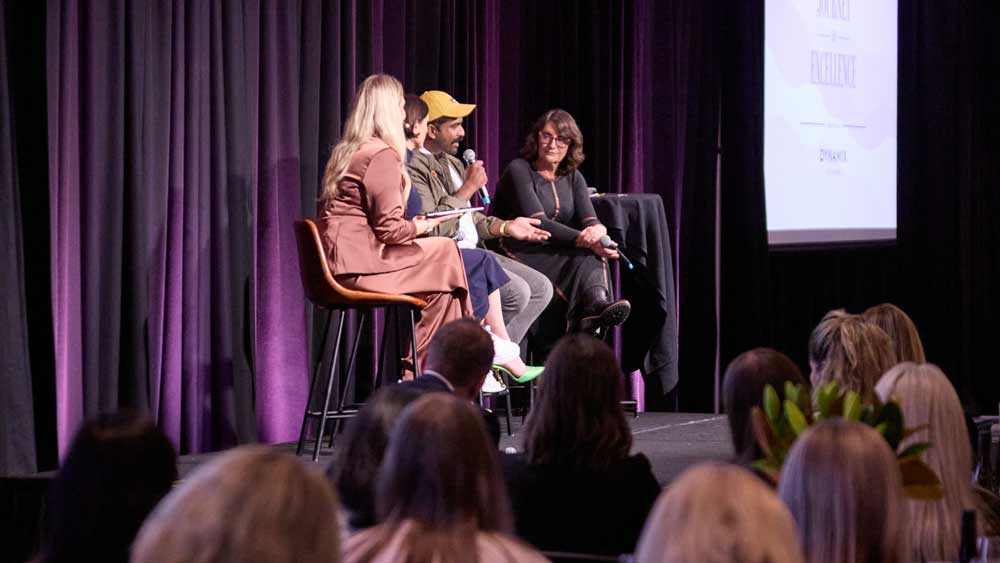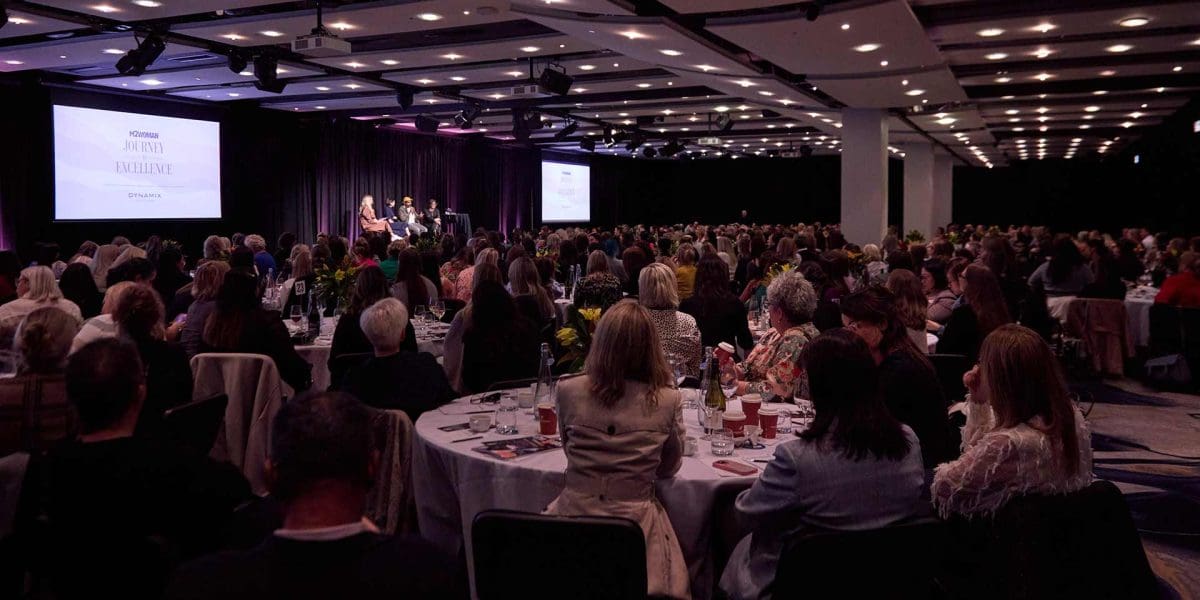Resilience, Leadership, Personal Growth and the Power of Staying Human
As the final keynote wrapped, MC Mel Homer invited three of the day’s standout speakers – Dr Alia Bojilova, Naomi Ballantyne, and Danu Abeysuriya – back on stage for an open conversation. “If there’s anything you think, gosh, she’s got to ask that and she hasn’t, let me know,” Mel said, before teasing that they were first taking a moment to photograph Dr Alia’s shoes. “Your shoes are boring, Danu,” she joked.
The panel kicked off with a challenge: which was harder, negotiating with terrorists or negotiating a pay rise? Dr Alia didn’t hesitate. “This is unfair,” she laughed. “Terrorists wanting to chop your head off – they were just humans with good reason in their own universe to behave the way they did. The hardest job I ever had was my first role outside of the military.” Without the clear purpose and deep connection she’d had in the army, she found herself adrift. “Yes, I would take a hostage taker any day.”

From there, Mel steered the conversation to imposter syndrome. Naomi admitted she still feels it. “One hundred percent of the time someone’s going to figure out I don’t know what I’m doing,” she said. In her early days raising capital and running a company, that fear was constant – but ultimately useful. “It stops you thinking you’ve got it all sorted and never need to change. For me, that fear drives forward momentum.”
Danu reframed the concept. “I think imposter syndrome probably needs to be rebranded. It’s probably just giving a shit about your job,” he said. At Rush, they once had a hiring motto: “hire paranoid people” – a recognition that thinking about edge cases, however unlikely, often leads to excellence. “If you care, you want to do a really good job. That’s not a syndrome.”
Alia agreed, calling fear “an indication that something matters.” She doesn’t want people holding themselves back by thinking they’re bound by a label. “If you care, you should be able to see yourself confidently and consciously pausing more often.”
The panel then explored stepping out of comfort zones. Naomi pointed to her retirement. “It’s hugely uncomfortable to be in the silence and figure out who I am now and what value I add,” she said. Alia shared that her recent decision to step away from a set of US companies was “probably the most ungrown-up decision” she’d made, yet it was the most logical for her values. Danu? “Ten seconds ago,” he quipped.

Talk turned to AI, where Danu advised, “Please and thank you – it’s a small chance computers will remember who was nice to them, but the consequences of them not are quite large.” Naomi added, “It’s easy to lose your humanity if you forget to say please and thank you, even to a computer.”
Addressing fears about AI replacing jobs, Danu called fear “healthy.” The real danger, he argued, is ignoring change. “It’s the unintended side effects that usually cause the biggest problems,” he said, urging people to focus on community over individualism. “If we tackle it together, we’ll come out stronger.”
The conversation returned to values. Danu described business today as “hand-to-hand combat,” where integrity matters most. “In tough times, if you don’t stick to your values, you’ll lose your reputation.” Naomi recalled the early days of COVID-19, running a life insurance company with no playbook. “If we go down, we’re going down well, properly, in the right way.” That, she said, is what keeps teams loyal.
Asked for the one piece of advice they wish they’d had before taking a big leap, Alia urged, “Mind where your mind goes. Start with the end in mind. Our brain is designed to prevent us from stretching ourselves – and that’s the job to be done.”
Danu’s advice was to separate emotion from logic. “Don’t be emotional about a logical decision, and don’t be logical about an emotional decision,” he said, noting how delay and avoidance only prolong discomfort. Naomi’s guidance was to embrace momentum over perfection. “You can make a wrong decision and then change it. People put so much weight on getting it perfect that they don’t make it at all.”
As the session wrapped, each panellist shared their key takeaway from the day. Naomi said it made her miss “being surrounded by really smart, intelligent people” who challenge her thinking. Danu emphasised “getting out of our own heads” and taking time to pause. Alia’s final thought: “Get out of your head and into the world. It certainly needs us.”
Action Points from the Panel
From Dr Alia Bojilova
See fear as a sign that something matters.
Pause and ask more questions before acting.
Step away from roles or projects that misalign with your core values.
Start with the end in mind when making big decisions.
Get out of your head and engage with the world.
From Naomi Ballantyne
Accept that imposter syndrome can be a driver of growth.
Value momentum over perfect decisions.
Step outside your comfort zone to discover new purpose.
Lead with integrity, especially in times of crisis.
Stay authentic – your people will stay loyal if they trust you.
From Danu Abeysuriya
Reframe imposter syndrome as caring deeply about your work.
Anticipate edge cases – the small risks with big consequences.
Keep a human in the loop when using technology.
Separate logic and emotion in decision-making.
Lean into community and shared values during change.
